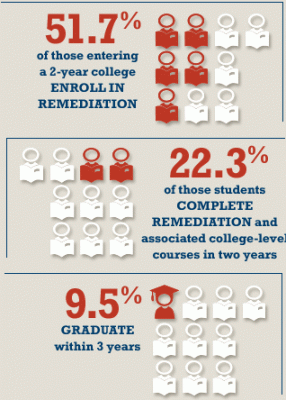K+12 and College Readiness
Readiness is a state of being fully prepared for something. Oftentimes, readiness is confused with actually doing the thing one is preparing for. The new DepEd K+12 curriculum is supposed to prepare high school students for higher education through one of the four strands in its academic track: Accountancy, Business and Management (ABM), Humanities and Social Sciences Strand (HUMSS), Science, Technology, Engineering and Mathematics (STEM), and General Academic. Looking at these strands demonstrates that not only should students be choosing whether to prepare oneself for work or college, but also commit to a particular area or discipline. The first question that comes to mind is whether public schools in the Philippines have the teachers qualified to teach these subjects. Looking at the strands in greater detail sparks even greater apprehension. For instance, Fr. Tabora, S.J. has this comment on his blog:
This is the data from the United States. It is definitely something to think about....
"In fact, in the presentations given by Dr. Tina Padolina on the Science, Technology and Mathematics (STEM) strand and by Dr. Maria Luz Vilches on Humanities in Senior High School, many of the subjects like Qualitative Research and Quantitative Research “sounded very HEI” – like belonging more to college or even graduate school education rather than to basic education. I squirmed to find out that future nurses shall be categorized under STEM and so be required to take even modified calculus. Is this really necessary?"DepEd's K+12 overall misses the point of what basic education really entails and what preparation really means. Even in the United States, where precollege education takes more than 13 years especially with preschool becoming widespread, there are still students that come out of high school unprepared for higher education. A study by Grubb and coworkers estimates that nationally, colleges assess about 60% of new college freshmen as needing remedial courses (Grubb, W. N., Boner, E., Frankel, K., Parker, L., Patterson, D., Gabriner, R., Hope, L., Schiorring, E., Smith, B., Taylor, R., Walton, I., and Wilson, S. (2011). Understanding the “crisis” in basic skills: Framing the issues in community colleges. Working paper. Policy Analysis for California Education) The reason is simple, these students are not able to master the basics. The early years are very important. Remediation is very difficult and it usually fails. Students cannot simply move forward when they are left behind. Remediation, for example, in mathematics is one challenging area and a recent study from New York shows that students are more likely to pass college-level, for-credit statistics than remedial algebra. Here is a figure from InsideHigherEd that summarizes the current status of remediation:
 |
| Above copied from InsideHigherEd |
This is the data from the United States. It is definitely something to think about....
Comments
Post a Comment